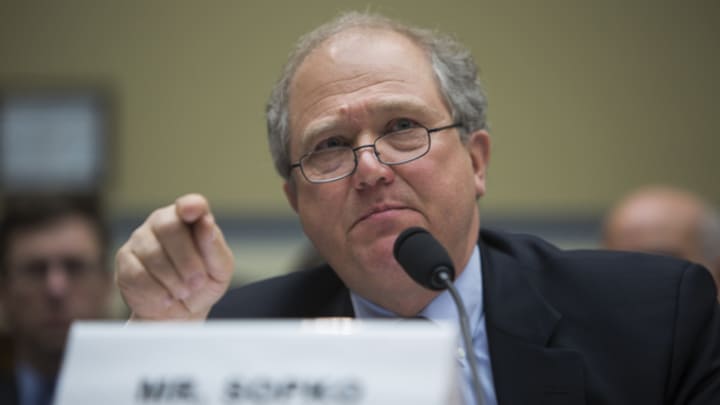
If Afghanistan does not do more to combat corruption in its financial sector by June, the country risks being “blacklisted” by an inter-governmental task force — which the U.S. watchdog for Afghan reconstruction said would would be “devastating” for the sector and the overall economy.
In the most dangerous country in the world for aid workers and where armed insurgents still control large swathes of territory, the reconstruction effort's number one enemy should be corruption, John Sopko, the special inspector general for Afghanistan reconstruction, said at an Atlantic Council event on Thursday.
Attracting and maintaining foreign investment is vital to sustaining Afghanistan's economy as U.S. assistance funding — which has totalled over $102 billion so far — declines.
That’s why Sopko criticized U.S. government agencies for failing to produce a comprehensive anti-corruption strategy, claiming that unless corruption is specifically targeted and combated it could be the "spoiler" that "will jeopardize every gain we have made over the last 12 years."
Corruption in Afghanistan's financial sector, he explained, presents a particular threat to the country's ability to attract foreign investment: "Failure to sufficiently reform and regulate the banking sector is putting the country's immediate future development at risk.”
‘This is serious’
Sopko reported that the Financial Action Task Force, an inter-governmental body that sets the standards required to combat money laundering, terrorist financing, and other threats to the integrity of the international financial system, recently downgraded Afghanistan's status based on the country's lack of progress implementing its anti-money laundering and terrorist financing action plan.
If Afghanistan continues to fall short on these measures, the FATF could "blacklist" the country as early as June June, an outcome the SIGAR chief said would be "devastating" for the country.
"This is serious … but the Afghan government has yet to take it seriously despite our embassy's efforts to convince them of its consequences to their long-term need to attract investments to improve their economy,” Sopko said.
The special inspector recalled how in 2010, U.S. government agencies took steps to address corruption in Afghanistan, with the U.S. State Department going so far as to circulate a draft of a "comprehensive anti-corruption strategy," which seems to have never been approved.
A whole-of-government approach
So does this strategy in fact exist right now?
In a written response to Devex, U.S. Agency for International Development Assistant Administrator Larry Sampler said that the United States “takes a whole-of-government approach to combating corruption in Afghanistan.”
"The embassy has anti-corruption working groups which meet regularly to ensure that anti-corruption efforts are fundamental elements in all of the work we do ... we believe that the best way to eliminate corruption is to build strong and transparent host-national institutions,” he added.
In recent months, Sampler has defended USAID's direct assistance funding to government ministries against SIGAR's criticisms. Earlier this year, SIGAR issued a report charging that the agency has continued to provide on-budget assistance to Afghan ministries despite the agency's own findings that those ministries are unequipped to manage funds.
USAID responded that on-budget assistance to Afghan ministries flows through accounts over which the U.S. government maintains sufficient control and spending oversight.
Read more on U.S. aid reform online, and subscribe to The Development Newswire to receive top international development headlines from the world’s leading donors, news sources and opinion leaders — emailed to you FREE every business day.
See more:
Afghanistan post-2014: Humanitarian relief or long-term development?
How USAID 'pushed back' to quell Afghanistan oversight fears
SIGAR chief to US contractors: Share information (before it’s too late)
SIGAR looks into 10 years of US aid to Afghanistan
US watchdog asks NGOs for tips to improve Afghan aid
